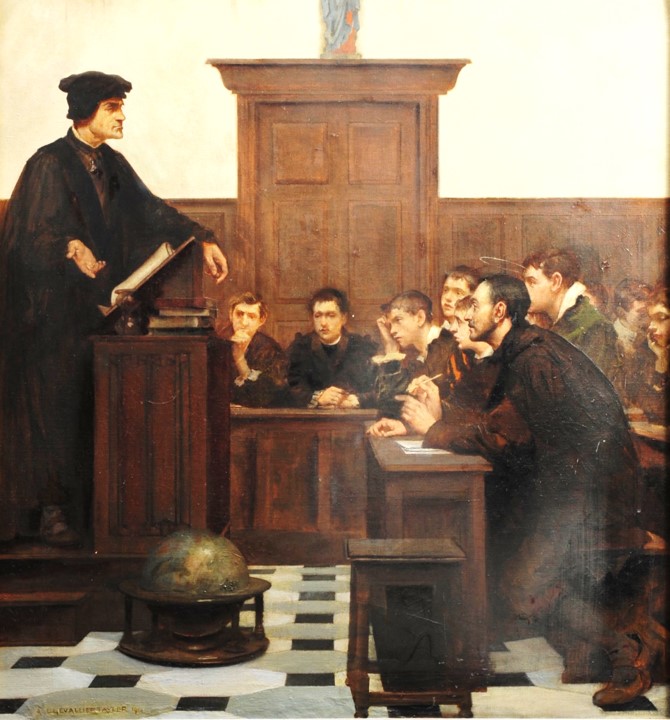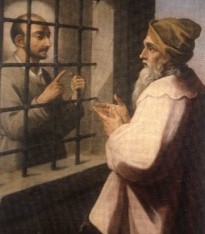
Chap. 6 Back to School (Spain 1524)
When Ignatius arrived in Spain he was told that the monk he wanted to study with had passed away. So instead of staying in Manresa, Ignatius returned to Barcelona and looked for someone else he could study with. Courses at that time were taught in Latin, and Ignatius never learned the language well, so he decided to start there first. He found a man at the church of Santa María del Mar named Ardévol who would give him lessons free of charge, and he also met a wealthy woman there named Isabel Roser who learned about Ignatius’s dreams of helping people spiritually, and she offered to support him financially. His old friend Inés Pascual also offered to let Ignatius use the small room in the house in Barcelona where he stayed before. In fact all his former friends were delighted to have Ignatius back and offered to do anything to help him however they could. Everything seemed to be falling into place for Ignatius.
In his spare time he looked for people to have spiritual conversations with, and eventually three people became followers of his. They were captivated by his words, and they marveled at his insights about Jesus and Scripture. Ignatius wondered if these men might help him start a new community centered around God and devoted to the kind of spirituality he was promoting. But it didn’t pan out, and each of the men returned to their regular lives. Ignatius didn’t become discouraged though because he still had many people who would visit with him regularly and listen to him talk. Many gave up their bad habits and started living a simpler, holier lifestyle. One of the townspeople became upset by this because he liked the immoral lifestyle he was living, and he didn’t want Ignatius changing how people in his community lived. So he hired a thug to track down Ignatius and beat him severely. The attack was so brutal that Ignatius was confined to a bed for two months while he recovered, but he never told the authorities who the perpetrator was, even though he knew the man’s identity. This was a stark change from Ignatius’s former ways. Two years ago he wanted to kill a Muslim for his comments about Mary, but now violence and revenge were far from his mind.
Ignatius spent two years studying Latin and made excellent progress. His teacher saw that he was ready for formal schooling now, and he recommended Ignatius enroll at a brand new university just outside of Madrid. Ignatius was happy to do so, and he would spend the better part of the next nine years in school. The first year and a half he spent at the University of Alcalá, although Ignatius was probably in over his head at first. He studied some of the most advanced philosophy and theology of the Middle Ages, and he’d have to repeat some of these courses later on. Ignatius was never a top student, but he always worked very hard, and he repeatedly forced himself to concentrate on his studies so that he could proceed through school and graduate. He probably did the same at Alcalá, although he never said much about what his studies were like there. He was more interested in talking to people about God.
Like before, Ignatius attracted a number of people who were intrigued by his insights about God, and they found great benefit doing the “spiritual exercises” he recommended. They were also inspired by his simple lifestyle and how he never sought to make money but preferred to beg for his food, shelter, and basic needs. His popularity made the religious authorities nervous, however, because other people had been preaching in the area and were drawing people away from the Church. These preachers were known as alumbrados (“enlightened ones”) and sought spiritual perfection on their own, rejecting Church leadership and the sacraments. Many believed them to be followers of Marin Luther and looking to cause division in Spain just like in Germany. When the Spanish Inquisition heard what Ignatius was up to, they decided to investigate.
One day a policeman came to visit Ignatius and invited him for a walk so they could have a conversation. Ignatius always welcomed the opportunity to talk to people, and he gladly walked alongside the man, not realizing where they were headed. When they reached the prison, it became clear that the policeman was luring Ignatius into being arrested, and he threw Ignatius into jail without explaining what the charge was. News spread through the town about the arrest, and many of Ignatius’ followers came to visit him, including his best friend Calisto, who stayed with him in prison for a few days. Ignatius’s friends told him that people were looking at them suspiciously, and many priests wouldn’t give them communion anymore. Apparently Ignatius was in trouble with the Inquisition, but why?

Eventually one of the priests met with Ignatius and asked him many questions about the women who had come to him for spiritual guidance. Many of his questions had to do with two women in particular, an older woman and her adult daughter, both of whom had disappeared. It seems the woman and her daughter wanted to visit cities throughout Spain so they could serve the poor, and people at Alcalá were worried they were dead. The priest wanted to know if Ignatius put them up to this, but he denied it. They kept him in prison anyway, but the woman and her daughter showed six weeks later. They were unharmed, and they told the authorities that Ignatius had nothing do with their departure. So the Inquisition finally released him. Altogether Ignatius spent 42 days in prison, even though he had done nothing wrong.
Ignatius was free now but was forbidden from teaching anyone for three years. They claimed he didn’t have the proper credentials. This injunction would prevent Ignatius from sharing his spiritual exercises with people, so he brought his case to the bishop. Unlike the Inquisition, the bishop was sympathetic to Ignatius yet reluctant to let him teach people officially since he didn’t have the training. So he encouraged Ignatius and his companions to continue their studies at one of the top universities in Spain, the University of Salamanca. The bishop even gave them money to help get them started.
Salamanca was located in the western part of Spain, and Ignatius traveled there with four of his companions from Alcalá. He spent one and a half years in Salamanca, but unfortunately he ran into the same trouble as before. Ignatius was becoming more famous now, and people were spreading rumors that he left Alcalá to avoid being executed by the Inquisition. A group of monks were suspicious of Ignatius and invited him over for dinner one evening, along with his friend Calisto. They talked about God and other spiritual matters, and some of the monks started to get upset. They didn’t think Ignatius had official authority to speak definitively about spiritual matters since he wasn’t a priest and didn’t have an official degree from a university, although other monks thought Ignatius’s views were perfectly fine. After some debate, they had Ignatius and his friend Calisto arrested, and they spent the next 22 days in prison. The two men were tied to each other with an 8-foot chain the entire time. Other companions came to visit them, and Ignatius continued to give spiritual guidance to people even while imprisoned. The Inquisition interrogated Ignatius about all sorts of religious topics, but his answers were always flawless, so they had to let the men go.
Ignatius was happy to be free again but furious that he kept getting arrested, and for no reason! All he wanted to do was help people grow closer to God, but the men who were supposed to be helping others were only hurting good people by throwing them in prison. So Ignatius decided to go to the best school in Europe: the University of Paris. A degree from there would mean no one could criticize his teachings since he would have the official training to back them up. Everyone tried to talk him out of it since France and Spain were still at war, and there were reports that French soldiers were seizing Spaniards and barbecuing them. But Ignatius had his mind made up, and he would do whatever it took to graduate from the University of Paris. He would also make arrangements there so that his friends could join him when they were ready.
Reflection questions:
- When have I taken risks before? How did those situations turn out? When have I been afraid to take a risk and later regretted it?
- We read about Ignatius being accused of wrongdoing, and this will not be the last time Ignatius will be treated this way. In fact he’ll be put on trial eight times. How have I pulled through when times were hard? Have I ever been falsely accused of something? How did I respond?
Click here for chapter 7
